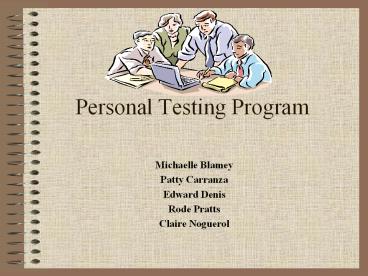Personal Testing Program - PowerPoint PPT Presentation
1 / 15
Title:
Personal Testing Program
Description:
Woodcock Munoz. CCAI - Cross-Cultural Adapability Inventory ... Woodcock Munoz Language Survey. Dr. Richard Woodcock & Ana F. Munoz-Sandoval ... – PowerPoint PPT presentation
Number of Views:223
Avg rating:3.0/5.0
Title: Personal Testing Program
1
Personal Testing Program
- Michaelle Blamey
- Patty Carranza
- Edward Denis
- Rode Pratts
- Claire Noguerol
2
Discovery School for Children(Student
Characteristics)
- Grades- Pre K 5th
- Ages- 4 - 11 years
- Rural area/primarily migrant community
- Ethnic breakdown
- Limited English Proficiency (LEP)
- Free and reduced lunches
- Mobility rate
- ESE breakdown
3
Coordination of Counseling Services
- Identifying problems relating to transience
- Grade placement
- Academic progress-
Quarterly academic review meetings - Coordinating peer facilitators
- Consultation w/teachers, parents, and
administrators - Transient individual/group counseling
4
School Testing Program
- State Mandated Tests
- Dallas Kinder-readiness
- SAT-9 (Standard Achievement Test) First
grade-second grade - mandatory - FCAT (Florida Comprehensive Achievement Test)
Third-fifth grade
- School Guidance Tests
- STAR Reading Test
- Woodcock Munoz
- CCAI - Cross-Cultural Adapability Inventory
- UNIT - Universal Nonverbal Intelligence Test
- Observation Survey of Early Literacy Achievement
5
STAR Reading Test
- Advantage Learning Systems, Inc., 2001
6
Purpose Considerations(STAR)
- Flexibility-can be used in all grade levels
- Placement for incoming students and ESOL students
- Scores can indicate normal grade level placement
- Measures vocabulary development as well as
reading comprehension - Computerized reading comprehension test
- Determines Accelerated Reading level of students
in grades 1-12
- Items in cloze format - sentence missing word
student chooses response in less than 1 minute - Responses sensitive to syntax and semantics
- Some proficiency in English needs to be
established before administrationAdministration
time 10 - 15 minutes
7
Universal Nonverbal Intelligence Test
- Bruce A. Bracken R. Steve McCallumRiverside
Publishing, 1998
8
Purpose Considerations (UNIT)
- Individual, comprehensive, standardized, norm
referenced assessment of general intelligence - Completely non-verbal
- Three forms are designed to fit different time
constraints and assessment need - Items administered using eight basic universal
hand signals and body signals
- Respondant uses paper, pencil, pointing and
manipulatives - Designed for children ages 5 to 17
- Five quotient scores-Full Scale Intelligence
Quotient-Memory Quotient-Reasoning
Quotient-Symbolic Quotient-Nonsymbolic Quotient
9
Culture-Free Self-Esteem Inventories
- James Battle, PhD
10
Purpose Considerations (CFSE-2)
- Identify those who need psychological assistance
- Two forms for grades 2-9
- Available in Spanish
- Yes/No responses according to how respondent
usually feels, thinks or behaves - Assesses six areas
- General Self Esteem
- Social/Peer-Related Self Esteem
- Academic/School Related Self Esteem
- Parental/Home Related Self Esteem
- Lie subtest
11
Woodcock Munoz Language Survey
- Dr. Richard Woodcock Ana F. Munoz-Sandoval
12
Purpose Considerations(WMLS)
- Measure of cognitive academic language
proficiency in English or Spanish - Assesses oral language, reading and writing in
the target language - Five levels of cognitive language proficiency are
measured from Negligible to Advanced - Ages 4 to adult
- 15-20 minutes to administer
13
An Observation Survey of Early Literacy
Achievement
- Marie Clay, 1993
14
Purpose Considerations
- Book - variety of assessments
- Entire survey gives complete picture of student's
reading and writing abilities and needs - Each skills test short in length
- Skills tests can be chosen according to
individual classroom need - Skills tests meant to be given individually
- Assesses early literacy skills- phonemic
segmentation and blending- oral reading-
writing dictation- sight word recognition-
letter identification- writing vocabulary-
writing sample
15
Other Factors/Considerations

